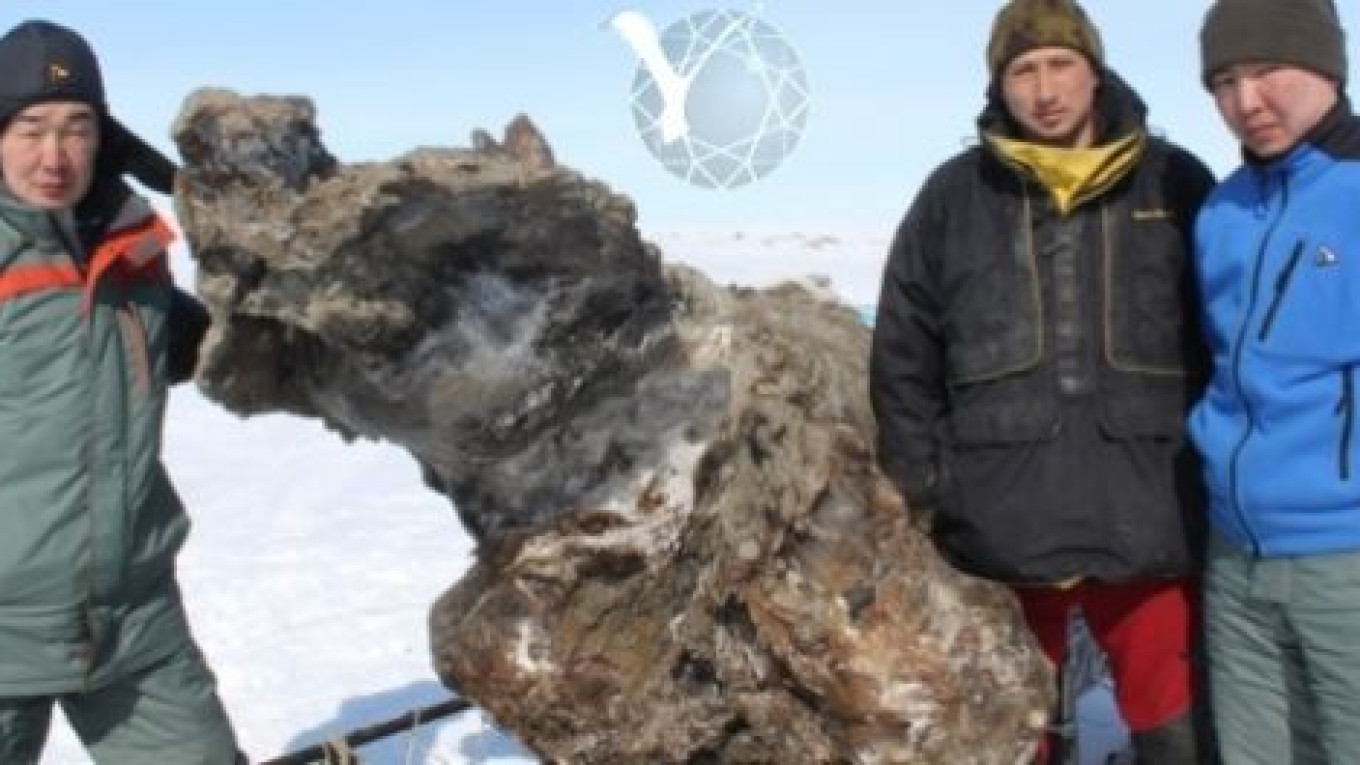A well-preserved mammoth corpse and a sample of mammoth blood found recently on an Arctic island have given Siberian scientists hope that they may be able to clone the animal in the future, one of the finders of the remains said Thursday.
“Mammoth corpses are found almost every year, but not every mammoth is preserved as well enough as this one for it to be possible to clone,” said Semyon Grigoryev, head of the mammoth laboratory at North-Eastern Federal University in Yakutsk.
This is the first well-preserved corpse of a mammoth found in the last 112 years, according to the laboratory's .
The scientific value of the find is equal to that of the first mammoth corpse discovery in 1900 on the banks of a Yakut river, a sample that became known as the Berezovsky Mammoth.
The corpse discovered earlier this month on one of the Lyakhovsky Islands, which are located in the Laptev Sea in the Far North, will be at least the fourth discovered by scientists in the last five years, Grigoryev said. The other three were also found in Siberia — two of them, of baby mammoths, in Yakutia, and one on the Taimyr Peninsula in the Far North, he said.
The discovery of the well-preserved corpse has scientists discussing cloning.
Fragments of muscle tissue found outside the body have the natural red color of fresh meat, he said. Researchers left most of the corpse, except for some fragments, in the permafrost for it to be preserved better.
The Mammoth Museum, which is affiliated with North-Eastern Federal University, and researchers with the South Korean Sooam Biotech Research Foundation will create a joint laboratory in the museum this summer to determine whether the corpse has living cells. If it does, it will be transported to South Korea to study the possibility of cloning the animal, Grigoryev said.
North-Eastern Federal University signed a research deal with the South Korean group last March to try to clone the creature, which went extinct 4,500 years ago.
“It will hardly happen in the next few years, though, because there are no methods that would allow the cloning of fossil animals,” he said.
Yevgeny Mashchenko, a senior researcher with the Paleontological Institute of the Russian Academy of Sciences, said earlier this week that it would be "very difficult" to extract the mammoth's DNA for cloning.
"Even if … the DNA is extracted … at the current level of technological development, this [cloning] is not possible and may become possible, I believe, not earlier than in 10 years, " he told the Vechernyaya Moskva daily on Sunday.
Blood was also found in the permafrost cavities beside the mammoth, despite temperatures of minus 7 to 10 degrees Celsius in the area, the laboratory's website said.
The Siberian researchers will be able to use the blood to examine a 2010 theory of Kevin Campbell, a professor of evolutionary physiology at the University of Manitoba in Canada, that hemoglobin in a mammoth's blood can carry oxygen even in low temperatures, the website said.
Scientists will also take bacteria samples from the mammoth's corpse to determine whether they contain agents of highly infectious diseases.
The expedition on which the mammoth's corpse was found took place between April 29 and May 22 and was organized by North-Eastern Federal University and the Russian Geographical Society.
Contact the author at n.krainova@imedia.ru
Related articles:
A Message from The Moscow Times:
Dear readers,
We are facing unprecedented challenges. Russia's Prosecutor General's Office has designated The Moscow Times as an "undesirable" organization, criminalizing our work and putting our staff at risk of prosecution. This follows our earlier unjust labeling as a "foreign agent."
These actions are direct attempts to silence independent journalism in Russia. The authorities claim our work "discredits the decisions of the Russian leadership." We see things differently: we strive to provide accurate, unbiased reporting on Russia.
We, the journalists of The Moscow Times, refuse to be silenced. But to continue our work, we need your help.
Your support, no matter how small, makes a world of difference. If you can, please support us monthly starting from just $2. It's quick to set up, and every contribution makes a significant impact.
By supporting The Moscow Times, you're defending open, independent journalism in the face of repression. Thank you for standing with us.
Remind me later.


